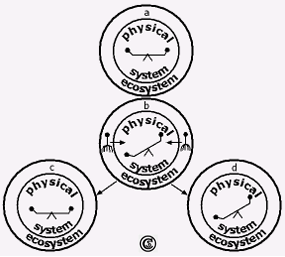Related terms to Landscape Sensitivity
Landscape sensitivity of: a) Physical system in equilibrium, b) Agricultural activities disturb the system, c) Physical system showing a relatively low sensitivity to the external effect, d) A high sensitive system that do not return to equilibrium
Image Credit: Stumptner, A. 2007
The ability of the system (e.g. a wateshed) faced with external interferences to withstand the change is often expressed by the term resilience. Often it is used as the antithetical term to sensitivity. A highly sensitive system possesses a low resilience and vice versa. Systems with low resilience are fragile. After disturbance these do not quickly return to their former equilibrium (see figure). Thus, ecologists employ sensitivity and fragility as synonyms. Although according to Thomas and Allison the term landscape sensitivity has a much broader scope than fragility; both terms are used here equivalently. The 'opposite' of both is landscape capacity. According to Tidemann (1996) this refers to such properties that determine the ability of a landscape to reproduce on a permanent basis. Although both terms are used in this way here, it has to be considered that sensitivity and capacity are not essentially interrelated in every landscape [16].
Landscape Sensitivity can vary through space and time [15].



